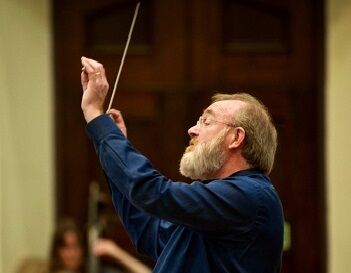Expert comment Last updated 10 June 2024

Busoni’s Piano Concerto in C has been called a “bewilderingly difficult composition”. It’s only fitting that the winner of the 2019 Ferruccio Busoni Piano Competition, RBC pianist Emanuil Ivanov, performs the mammoth piece in RBC’s end-of-year concert on Fri 14 Jun. He is joined by the RBC Symphony Orchestra and inspirational force in British music, conductor Martyn Brabbins.
Ahead of the concert, we spoke to Emanuil and Martyn to understand what’s involved in tackling Busoni’s work of extremes from both the pianist's and conductor’s perspectives.
The New York Times says, “There are piano concertos, and then there is Ferruccio Busoni’s Piano Concerto.” The piece is known for its epic proportions. Can you share your initial reactions to tackling this monumental piece?
Martyn Brabbins (MB): The reputation of the Busoni concerto strides before it. Epic proportions and complex, both musically and emotionally. My task at this stage is to familiarise myself with all the score’s demands. In order to enable the soloist to fly with the piece, the orchestra needs to support and illuminate the piano part.
Performing such an epic work is a significant undertaking. Can you tell us about being the 2019 Ferruccio Busoni Piano Competition winner and your personal connection to the concerto?
Emanuil Ivanov (EI): I first came across this concerto long before I won the competition, around my early teens. It immediately struck me as something extraordinary, a concerto unlike any other, and it has always been a dream of mine to perform it. Thanks to the wonders of YouTube, I began discovering more and more of Busoni's works, as well as some of his own recordings and piano rolls. Since then, he has been one of my greatest idols, both as a pianist and as a composer, and certainly, a figure that inspires a lot of what I do as a musician. In this regard, it's a great honour and privilege to be the winner of a prize that bears his name.
The New Yorker says, “The score urges the performers to go for broke: there are passages marked “audaciously,” “frenziedly,” “raging,” “impolitely”.” From a conductor's perspective, how do you approach rehearsing such a complex and extensive work with the orchestra?
MB: There will be a lot of detailed work with the young musicians of the orchestra. Accompanying is an art in itself. And of course, I will spend time with the soloist one to one in order to familiarise myself with the nuances of his interpretation.
The Concerto is notorious for its technical demands. Can you walk us through your preparation process and any specific techniques you use to tackle the most challenging passages?
EI: The piano part is indeed quite unforgiving and requires enormous stamina. It's very important to be mindful of the energy you use and be strategic about it, otherwise, it can deplete pretty quickly. As for the more challenging bits, as always, slow practice works very well for me, as well as rhythmic variations. I also like to record myself quite often, it often works as a good simulation of the pressure of performing live and gives me a bit more security. In addition to that, it's always beneficial to hear what you are doing, as it might be quite different from what you hear in front of the keyboard.
Are there particular themes or motifs within the piece that you feel are especially important to convey to the audience?
EI: Busoni's Piano Concerto, like all great music, is a work of extremes. It is conceived on the grandest scale and has a tremendous emotional and expressive scope. It should be tackled in the most uncompromising way, requiring the performers to be bold and fearless without smoothing out any of its more striking features.
What are you most looking forward to bringing to life in the performance? Is there a specific section that you’d like to draw the audience’s attention to?
MB: The audience will, I hope, be drawn into the journey the concerto takes them on. Concentration and alertness are required by us all!
What emotions or messages do you hope to communicate through your performance?
EI: When performing any work of music, my primary goal is to share. To share this dazzling outburst of creativity, its power, its sublime beauty, to share my excitement for every aspect of it. The Busoni Concerto has a vast emotional wealth but almost nothing too concrete or programmatic, as it remains relatively abstract until the finale. The choral final movement uses a text from the finale of Adam Oehlenschläger's drama Aladdin, which is very close in its mysticism to the conclusion of Goethe's Faust. But, above all, I feel this concerto is a grand celebration of human creativity and, by bringing together so many performers, by merging so many different elements, styles and genres, it conveys a strong message of unity. And I sincerely hope these ideas come through in our performance.
What do you hope the audience will take away from experiencing this rarely performed masterpiece?
MB: We will all have shared a unique experience, one which I hope will resonate for a long time after the concert.
--
We are thrilled to have Martyn conduct our end-of-year celebrations with RBC’s Symphony Orchestra on Fri 14 Jun. With a world première of ‘The Lily’ by Kinna Whitehead, dazzling orchestral colour in Respighi’s ‘Pines of Rome’, and Busoni’s epic ‘Piano Concerto in C’, as performed by Emanuil Ivanov, the night is set to showcase remarkable skill and talent.
Tickets for Martyn Brabbins conducts RBC Symphony Orchestra on Friday 14 June are available here.